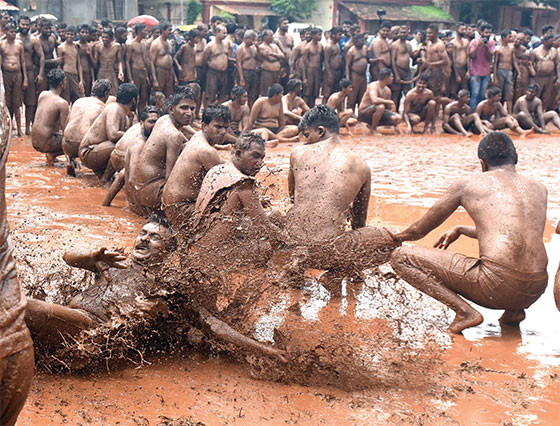THE EARTHY FESTIVAL OF CHIKAL KALO

It is found all
over the world, especially in agricultural belts. Large fields full of men smearing mud on
others, watched by large enthusiastic crowds. Everyone has a raucous time. In
Goa, it is called Chikal Kalo or playing in mud. It is celebrated on the
twelfth day of the month of Asadh in July. This is celebrated by remembering
the antics of Lord Krishna the child in Braj Bhumi.
On the appointed day, the residents of Marcel gathered in strength
to play. According to Kalpesh Naik, who went to Marcel for the festival, it was
a fantastic experience. Kalpesh said, “Participation was very good. You have to
remember this is a tradition that is over 300 years old or even older and it is
an occasion for families to come together and watch. There were more than 150
participants who were on the field. Each game takes around an hour and a half
to complete.” He said it was very noisy, with some people praying and others
just revelling in the spirit of the celebration. Several men, he said, also
applied oil on their bodies, to possibly protect them against any infection.
With tilak on the forehead, each participant circumambulated the temple and
then headed to the mud-filled space.
No commercial activity
is allowed in the vicinity though plenty of food and sweets are available. He
informed that some other games played on the occasion were Mendrani, Dharchyani
or Dog and Bone, Tug of War, Kabbadi, etc.
When asked about the
origin of the festival, he said it probably came about due to the outcome of
the natural and cultural setting of the place. It perhaps signifies the
importance of nature in the state’s culture.
However, in Goa like
in the rest of the country, there are other theories propounded too. During
Portuguese rule, the colonial rulers destroyed Hindu temples, so most of the
people, in an attempt to protect their deities, shifted their temples to Ponda
as that region was then ruled by a Hindu ruler. Some temples were brought to
Marcel as well. So it’s possible that this festival was started to unite
people, who had come from different regions. It helped them bond.
According to Kalpesh, one of the best thing that comes out this festival is that it includes peoples of all kinds, irrespective of what caste or class they belong to. He concluded by saying, “It is said that once you are covered in mud, all are of the same colour, so all are equal. This is the thing I admire the most about Chikal Kalo.”
- | 16 Jul, 2019, 04:20AM